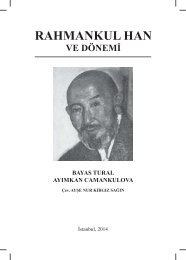THE SOVIET HISTORIOGRAPHY AND THE QUESTION OF KAZAKHSTAN’S HISTORY
SOVYET-TARIH-YAZICILIGI-ENG
SOVYET-TARIH-YAZICILIGI-ENG
You also want an ePaper? Increase the reach of your titles
YUMPU automatically turns print PDFs into web optimized ePapers that Google loves.
192<br />
<strong>THE</strong> <strong>SOVIET</strong> <strong>HISTORIOGRAPHY</strong> <strong>AND</strong><br />
Tatars’ ethnic background and the question of the word “Tatar”.<br />
The Etymology of the Word “Tatar”<br />
The word “Tatar” appeared firstly as the name of some nomadic tribal<br />
units of the north of China between seventh and twelfth centuries.<br />
Orkhon Inscriptions (eighth century) name “Otuz Tatar” and “Dokuz<br />
Tatar” units. Chinese sources mention about a grand and strong tribal<br />
confederation named “Ta-ta” (“Da-da”) with ninth century. Among<br />
these units, it can be guessed that Kara Tatar (Otuz Tatar) referred to<br />
the Mongols; whereas, Ak Tatar (Dokuz Tatar) meant the Turks. 347 In<br />
the course of time, the name of these units who disturbed the Chinese<br />
via frequent raids began to gain “barbarian” and “brutal” meanings<br />
in China and turned into a common name encompassing all tribes<br />
in the north of China. With this usage, the word “Tatar” was loaned<br />
to the Arabs and Iranians by the Chinese. 348 The Islamic sources of<br />
eleventh and tenth centuries refer to the nations of Eastern Turkestan<br />
and Mongolia as “Tatars”. In the dictionary of Mahmud of Kashgar<br />
(eleventh century), this region is called “Deşt-i Tatar” (Tatar Plain). 349<br />
According to the rumours, Genghis Khan had a profound hatred<br />
against the Tatars who acted negatively against his tribe and he<br />
defeated them on the eve of the establishment of Mongol Empire<br />
(1202) via exterminating a big number of them and separating their<br />
tribes. Subsequently, the remnants of Tatars lost their identities by<br />
integrating into the society of Mongol union majority. 350 However,<br />
we can as well observe that despite Tatar tribes’ disappearance, the<br />
name “Tatar” continued to prevail and Mongols began to be known<br />
as “Tatars”. It can be guessed that the European travellers and tradesmen<br />
in Asia spread the name “Tatar” to Europe before the Mongol<br />
invasions. The records reveal that Genghis Khan was irritated by the<br />
reference to Mongols as Tatars and prohibited such calling. During<br />
the visit of European traveller Wilhelm von Rubruk to the Mongolian<br />
headquarters in 1254, the guest was warned of the prohibition of the<br />
usage of “Tatar” word. 351<br />
347 “Tatarlar”, Büyük Larousse Sözlük ve Ansiklopedisi, C. 22, Milliyet Yay., İstanbul<br />
1986, p. 11300; “Tatarı”, Tatarskiy Entsiklopediçeskiy Slovar, Institut Tatarskoy Entsiklopedii<br />
AN RT, Kazan 1999, p. 566.<br />
348 Karimullin, A., Tatarı:Etnos i Etnonim, Tatarskoye Knijnoye izd-vo, Kazan 1989,<br />
p. 18.<br />
349 “Tatarı”, Tatarskiy entsiklopediçeskiy slovar, p. 566.<br />
350 Karimullin, p. 18; Büyük Larousse Sözlük ve Ansiklopedisi, p. 11300.<br />
351 Karimullin, pp. 18-19.



